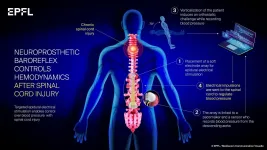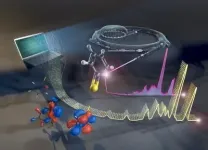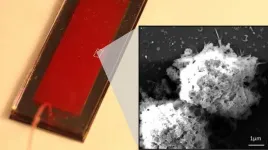New treatment helps patients with a spinal cord injury
Spinal cord injuries disrupt the mechanism by which our bodies regulate blood pressure; a team of Swiss and Canadian scientists have developed a treatment that allows patients to regain control of their blood pressure
2021-01-28
(Press-News.org) An international team of scientists headed by Grégoire Courtine at EPFL and CHUV and Aaron Phillips at the University of Calgary has developed a treatment that can dramatically improve the lives of patients with a spinal cord injury.
VIDEO: https://www.youtube.com/watch?v=UGXnuHgDWFU
"A serious and underrecognized result of these injuries is unstable blood pressure, which can have devastating consequences that reduce quality of life and are life threatening. Unfortunately, there are no effective therapies for unstable blood pressure after spinal cord injury". said Dr. Aaron Phillips, co-lead author of the study (see affiliations below). "We created the first platform to understand the mechanisms underlying blood pressure instability after spinal cord injury."
Their findings, published today in Nature, builds on research that has already enabled several paraplegics to walk again through epidural electrical stimulation (EES). But instead of targeting the region of the spinal cord that produces leg movements, they delivered EES in the region containing the neural circuits that regulate blood pressure. In addition, they adapted the stimulation protocol in real-time based on measurements taken by a blood-pressure monitor implanted in an artery. The monitor measures blood pressure continuously, and adapts the instructions sent to a pacemaker that in turn delivers electrical pulses over the spinal cord. The stimulation is biomimetic, since it recapitulates the natural activation of the body's hemodynamic system. "The stimulation compensates for the broken communication line between the patient's central nervous system and sympathetic nervous system," says Courtine.
The research team initially tested their method in preclinical rodent and nonhuman primate models in order to understand the mechanisms that disrupt blood pressure modulation after spinal cord injury, and to identify where and how the stimulation patterns should be applied to obtain the desired hemodynamic responses. Jocelyne Bloch, the neurosurgeon who heads the .NeuroRestore research center with Courtine and who carried out the surgical implants, was surprised at how quickly the stimulation protocol worked. "It was impressive to see the blood pressure rise to the target level immediately after the stimulation was applied," she says.
After these initial tests, the scientists tried their method on a human patient.
"I suffered from daily episodes of low blood pressure, especially in the morning and evening," says Richi, 38 years old. "But since I've had the implant, it happens much less often - maybe once every couple of weeks." Himself a surgeon, Richi lost the use of all four limbs after a sport accident. "Those daily episodes of hypotension were a real burden. They also disturbed my vision and prevented me from performing even simple everyday tasks. The electrical stimulation treatment provided a huge relief - much more effective than medication."
One of the physicians working with Richi, Dr. Sean Dukelow, states: "Since using this system, Richi was able to completely stop all drugs he was using to manage blood pressure instability. This has been transformative, and over the long-term may reduce Richi's risk of cardiovascular disease."
The team intends to continue its research thanks to a large grant received from the US Defense Advanced Research Projects Agency (DARPA). At the same time, Onward (formerly GTX Medical) - a startup based at EPFL Innovation Park and in the Netherlands - will develop and market clinical devices based on the team's discoveries.
INFORMATION:
[Attachments] See images for this press release:

ELSE PRESS RELEASES FROM THIS DATE:
2021-01-28
Thursday, 28 January 2021: A study has found that adolescents who frequently use cannabis may experience a decline in Intelligence Quotient (IQ) over time. The findings of the research provide further insight into the harmful neurological and cognitive effects of frequent cannabis use on young people.
The paper, led by researchers at RCSI University of Medicine and Health Sciences, is published in Psychological Medicine.
The results revealed that there were declines of approximately 2 IQ points over time in those who use cannabis frequently compared to those who didn't use cannabis. Further analysis suggested that this decline in IQ points was primarily related to reduction in verbal IQ.
The research involved systematic review and statistical analysis on seven longitudinal studies ...
2021-01-28
New insight into how human brains detect and perceive different types of touch, such as fluttery vibrations and steady pressures, has been revealed by UCL scientists with the help of the ancient Chinese cooking ingredient, Szechuan pepper.
Humans have many different types of receptor cells in the skin that allow us to perceive different types of touch. For more than a century, scientists have puzzled over whether touch signals from each type of receptor are processed independently by the brain, or whether these different signals interact before reaching conscious perception.
For the study, published in Proceedings of the Royal Society B, UCL researchers took a novel approach to this question by stimulating one type of touch receptor chemically, and another type mechanically. ...
2021-01-28
Investors' moods are affected by gloomy weather. New research from Copenhagen Business School recommends entrepreneurs looking for finance should be aware of the weather forecast at the time they want to launch their crowdfunding campaigns.
The researchers wanted to explore whether weather-induced moods can explain crowdfunders' contributions and focused on the role of investors' moods and emotions including day-to-day decisions on the crowdfunding platform Companisto.
"Financial investment plays a vital role in the success of an entrepreneurial venture ...
2021-01-28
Molecules consisting of many atoms are complex structures. The outer electrons are distributed among the different orbitals, and their shape and occupation determine the chemical behaviour and reactivity of the molecule. The configuration of these orbitals can be analysed experimentally. Synchrotron sources such as BESSY II provide a method for this purpose: Resonant inelastic X-ray scattering (RIXS). However, to obtain information about the orbitals from experimental data, quantum chemical simulations are necessary. Typical computing times for larger molecules take weeks, even on high-performance computers.
Speeding up the evaluation
"Up to now, these calculations have mostly been carried out subsequent to the measurements", explains theoretical chemist Dr. Vinicius Vaz da Cruz, ...
2021-01-28
Researchers at Lund University in Sweden believe they have identified a gene variant that can cause cerebral small vessel disease and stroke. The study is published in Neurology Genetics.
"The patients we have studied are from the same extended family, and several of them have been diagnosed with cerebral small vessel disease and suffered strokes. After tissue examination and using genetic sequencing methods, we found that they were carriers of a new gene variant that could be connected to their diagnoses," says Andreea Ilinca, researcher at Lund University ...
2021-01-28
Recent events such as the Covid-19 pandemic, locust infestations, drought and labour shortages have disrupted food supply chains, endangering food security in the process. A recent study published in Nature Food shows that trade restrictions and stockpiling of supplies by a few key countries could create global food price spikes and severe local food shortages during times of threat.
'We quantified the potential effects of these co-occurring global and local shocks globally with their impacts on food security,' explains Aalto University Associate Professor Matti Kummu. The results of this research have critical ...
2021-01-28
A new type of rocket thruster that could take humankind to Mars and beyond has been proposed by a physicist at the U.S. Department of Energy's (DOE) Princeton Plasma Physics Laboratory (PPPL).
The device would apply magnetic fields to cause particles of plasma, electrically charged gas also known as the fourth state of matter, to shoot out the back of a rocket and, because of the conservation of momentum, propel the craft forward. Current space-proven plasma thrusters use electric fields to propel the particles.
The new concept would accelerate the particles using magnetic reconnection, a process found throughout the universe, including the surface of the sun, in which magnetic ...
2021-01-28
Knowing how to predict the specific composition and cell design that would result in optimum performance is one of the greatest unresolved problems in materials science. This is, in part, due to the fact that the device performance depends on multiple factors.
Now, researchers from the Institute of Materials Science of Barcelona, specialized on materials for energy applications, have collaborated with researchers from the Universitat Rovira i Virgili specialized in Artificial Intelligence, to combine the experimental data points that they gather with artificial intelligence algorithms ...
2021-01-28
Building on the promise of emerging therapies to deploy the body's "natural killer" immune cells to fight cancer, researchers at the University of Michigan Rogel Cancer Center and U-M College of Engineering have gone one step further.
They've developed what is believed to be the first systematic way to catch natural killer cells and get them to release cancer-killing packets called exosomes. These nano-scale exosomes are thousands of times smaller than natural killer cells -- or NK cells for short -- and thus better able to penetrate cancer cells' defenses.
A proof-of-concept study in blood samples from five patients with non-small cell lung cancer demonstrated that the approach was able to capture natural killer cells on a microfluidic ...
2021-01-28
Paris, France, January 27th 2021 -- COVID-19 vaccine distribution has begun across the globe, while many countries are still struggling with the rampant rise of infections. Owkin, a French-American startup pioneering AI and Federated Learning in medical research, has been focusing it's COVID-19 research efforts on aspects of the pandemic that still require much public health attention, despite the arrival of an effective vaccine.
Efforts to support frontline health systems as they devote their resources to the influx of COVID-19 related hospitalizations, ...
LAST 30 PRESS RELEASES:
[Press-News.org] New treatment helps patients with a spinal cord injury
Spinal cord injuries disrupt the mechanism by which our bodies regulate blood pressure; a team of Swiss and Canadian scientists have developed a treatment that allows patients to regain control of their blood pressure





